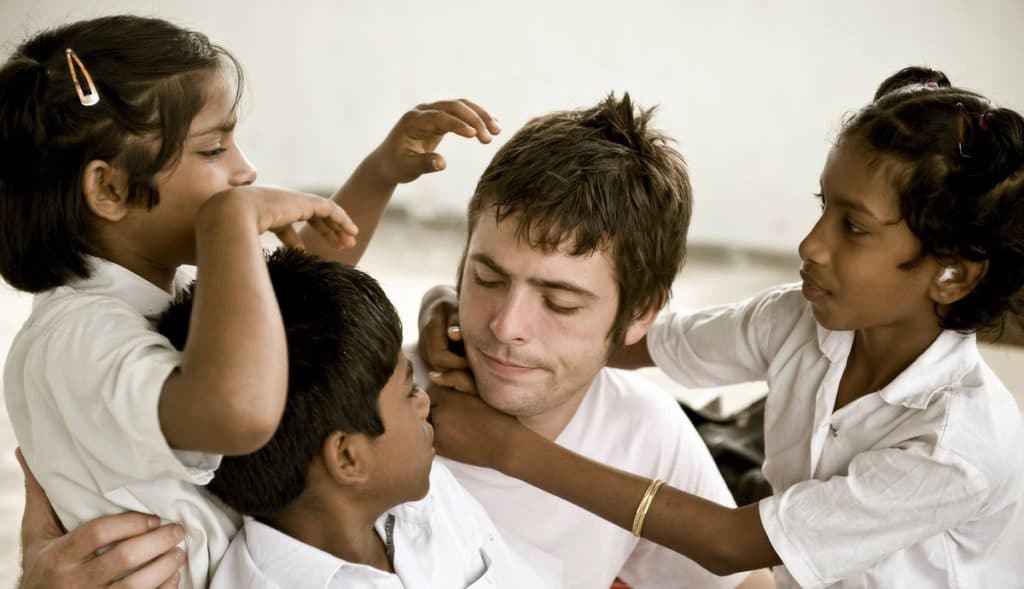Life changed for Rocky Braat almost a decade ago, when he met a group of HIV positive children living in an orphanage in Chennai. Braat, 36, who was on a visit to India from Pittsburg, Pennsylvania, decided to leave his life, friends, and career in the United States to live with the young patients.
That was in 2008. Five years later, Braat’s life inspired the documentary film, Blood Brother, that won several awards, including the Grand Jury Prize at the Sundance Film Festival in 2013. The film, made by Braat’s friend Steve Hoover, is a story about the power of love in the face of death.
Braat tells Little India about his life in India over the last 10 years.
When It All Began
On a trip with the kids at the AIDS home, Nimmy and their daughter.
I was working full-time as an art director and spent 8-10 hours a day in a cubicle and felt increasingly dissatisfied. I thought there was more I could do with my life and my time, which would be of a greater impact. That is when I took a flight to India.
I originally wanted to visit the Sisters of Charity in Kolkata. But my friend suggested that I stop by in Chennai to see an AIDS home. After spending time with the kids at the Hope Foundation home in Chennai it didn’t seem to make sense to go to back to Kolkata.
I never thought I would settle in India. But if I felt needed and useful to the people I was serving, I was happy to be living here.
The Migration Process
I received my citizenship two years back after a pretty lengthy process, involving a series of documents and trips to the Foreigners Regional Registration Office before I was granted my Overseas Citizen of India (OCI) card.
Marrying a Tamil Girl
Prior to getting married, I had lived in a village for nearly four years. At no point did I attempt to run away from the lifestyle here. I fully embraced it
Nimmy and I are very like-minded and we like what we do together so I really enjoy being married to an Indian. We have similar views on life, similar views on what’s important, like family and how to raise children. Although I was raised as an American I really appreciate and admire Indian women and their work ethic, and their views on family.
Change in Lifestyle
Rocky’s Wife, Nimmy and his daughter Jiya.
I was never very super American by American standards. I was also raised open-minded, so adapting to the Indian culture wasn’t a huge challenge for me. It’s only things like rash driving that tick me off the most in India.
When I first came I was pretty unimpressed by the cuisine and struggled with eating the same thing day after day. I started to loath rice. However, over time I’ve started to prefer rice and gravy, and find foreign food less satisfying.
Blending In
In the beginning people are excited for your arrival as a foreigner and want to make you feel welcomed. But as you become a part of the society people don’t really seem to notice. I blend in very well, speak their language and live the same way, so people treat me like any other local person.
Working in India
I and my wife run an organization called the Light Partnerships. We run three small programs. The first initiative involves offering free ambulance service to villagers. We also provide a home and family for orphaned HIV positive teenagers, and teach English and computers to the students from the deprived communities.
Path Ahead
As time goes on I feel less needed here because now I feel there are plenty of resources for people to solve problems if they want to. When I first met the children in Chennai, the need was so intense and raw that I was motivated to give up everything and be a part of the solution. There are 20 million orphans in India, and lots of other opportunities to get engaged and re-engaged. It’s important for me to feel that my work matters to the people I am doing it for.
The interview has been condensed and edited.
Expat Voice is regular column on expats in India. Email us at expat@littleindia.com to nominate yourself or another expat for the column.
